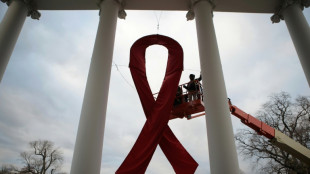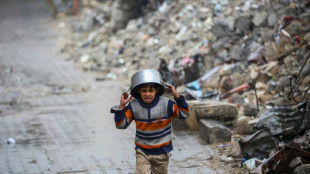
-
 Cycling chiefs seek WADA ruling on carbon monoxide use
Cycling chiefs seek WADA ruling on carbon monoxide use
-
Israel pounds Beirut as security cabinet to discuss ceasefire

-
 Fewest new HIV cases since late 1980s: UNAIDS report
Fewest new HIV cases since late 1980s: UNAIDS report
-
4 security forces killed as ex-PM Khan supporters flood Pakistan capital

-
 Four bodies, four survivors recovered from Egypt Red Sea sinking: governor
Four bodies, four survivors recovered from Egypt Red Sea sinking: governor
-
Ayub century helps Pakistan crush Zimbabwe, level series

-
 French court cracks down on Corsican language use in local assembly
French court cracks down on Corsican language use in local assembly
-
Prosecutors seek up to 14-year terms for French rape trial defendants

-
 Russia expels UK diplomat accused of espionage
Russia expels UK diplomat accused of espionage
-
Israeli security cabinet to discuss ceasefire as US says deal 'close'

-
 COP29 president blames rich countries for 'imperfect' deal
COP29 president blames rich countries for 'imperfect' deal
-
Stocks retreat, dollar mixed on Trump tariff warning

-
 No regrets: Merkel looks back at refugee crisis, Russia ties
No regrets: Merkel looks back at refugee crisis, Russia ties
-
IPL history-maker, 13, who 'came on Earth to play cricket'

-
 Ukraine says Russia using landmines to carry out 'genocidal activities'
Ukraine says Russia using landmines to carry out 'genocidal activities'
-
Prosecutors seek up to 12-year terms for French rape trial defendants

-
 'Record' drone barrage pummels Ukraine as missile tensions seethe
'Record' drone barrage pummels Ukraine as missile tensions seethe
-
Laos hostel staff detained after backpackers' deaths

-
 Hong Kong LGBTQ advocate wins posthumous legal victory
Hong Kong LGBTQ advocate wins posthumous legal victory
-
Ukraine says cannot meet landmine destruction pledge due to Russia invasion

-
 Rod Stewart to play Glastonbury legends slot
Rod Stewart to play Glastonbury legends slot
-
Winter rains pile misery on war-torn Gaza's displaced

-
 'Taiwan also has baseball': jubilant fans celebrate historic win
'Taiwan also has baseball': jubilant fans celebrate historic win
-
Russia pummels Ukraine with 'record' drone barrage

-
 Paul Pogba blackmail trial set to open in Paris
Paul Pogba blackmail trial set to open in Paris
-
China's Huawei unveils 'milestone' smartphone with homegrown OS

-
 Landmine victims gather to protest US decision to supply Ukraine
Landmine victims gather to protest US decision to supply Ukraine
-
Indian rival royal factions clash outside palace

-
 Equity markets retreat, dollar gains as Trump fires tariff warning
Equity markets retreat, dollar gains as Trump fires tariff warning
-
Manga adaptation 'Drops of God' nets International Emmy Award

-
 China's Huawei launches 'milestone' smartphone with homegrown OS
China's Huawei launches 'milestone' smartphone with homegrown OS
-
Philippine VP denies assassination plot against Marcos

-
 Four Pakistan security forces killed as ex-PM Khan supporters flood capital
Four Pakistan security forces killed as ex-PM Khan supporters flood capital
-
Hong Kong's legal battles over LGBTQ rights: key dates

-
 US lawmakers warn Hong Kong becoming financial crime hub
US lawmakers warn Hong Kong becoming financial crime hub
-
Compressed natural gas vehicles gain slow momentum in Nigeria

-
 As Arctic climate warms, even Santa runs short of snow
As Arctic climate warms, even Santa runs short of snow
-
Plastic pollution talks: the key sticking points

-
 Indonesia rejects Apple's $100 million investment offer
Indonesia rejects Apple's $100 million investment offer
-
Pakistan police fire tear gas, rubber bullets at ex-PM Khan supporters

-
 Ronaldo double takes Al Nassr to brink of AFC Champions League last 16
Ronaldo double takes Al Nassr to brink of AFC Champions League last 16
-
Pakistan police fire tear gas, rubber bullets at pro-Khan supporters

-
 Hong Kong same-sex couples win housing, inheritance rights
Hong Kong same-sex couples win housing, inheritance rights
-
Indonesia digs out as flooding, landslide death toll hits 20

-
 Liverpool's old guard thriving despite uncertain futures
Liverpool's old guard thriving despite uncertain futures
-
Mbappe takes reins for Real Madrid in Liverpool clash

-
 As AI gets real, slow and steady wins the race
As AI gets real, slow and steady wins the race
-
China's Huawei to launch 'milestone' smartphone with homegrown OS

-
 Porzingis and Morant make triumphant NBA returns
Porzingis and Morant make triumphant NBA returns
-
Hong Kong top court affirms housing, inheritance rights for same-sex couples


Mexican tourist train raises fears for subterranean treasures
Bulldozers sit idle next to tree stumps along the disputed route of a new Mexican tourist train. Beneath the jungle, environmentalists warn that a magical labyrinth of underground rivers and caves is also under threat.
The rail link under construction between popular Caribbean beach resorts and archeological ruins is at the center of a legal battle between authorities and activists.
Last month a judge suspended work on part of the roughly 1,500-kilometer (950 mile) long Mayan Train -- a flagship project of President Andres Manuel Lopez Obrador.
Opponents fear that a section between the resorts of Playa del Carmen and Tulum will cause irreparable damage to a subterranean network of caves, rivers and freshwater sinkholes known as cenotes connected to the Caribbean Sea.
"It's suicide," said Tania Ramirez, a 42-year-old activist and cave expert.
"It's like cutting your wrists," she told AFP.
Often filled with stunning emerald or turquoise waters illuminated by a shaft of light from above, cenotes are a major attraction for tourists visiting the Riviera Maya in the Yucatan Peninsula.
The sinkholes number in the thousands in the lush Mayan jungle and are connected to a giant aquifer that is a source of drinking water for local communities.
The most recently discovered cave holds archaeological remains, said Ramirez, who believes that Maya indigenous people once kept food there.
"You can find a cave at every step," she said.
While authorities often insist the caves are not on the planned line but rather next to it, in reality everything is connected, Ramirez added.
- 'Gruyere cheese' -
Activists describe the area below ground as "gruyere cheese" because of all the holes.
"It's a hollow area that wouldn't support the weight of a train," said Vicente Fito, a 48-year-old diver who ventures into the subterranean world almost daily.
The line "is going to go through places where everything is like that, with or without water, but hollow."
The original plan for the disputed section was for an overpass over a highway, but the route was modified at the start of the year to go through jungle at ground level.
Lopez Obrador, who hopes to inaugurate the railroad at the end of 2023, said the reason was that the land is firmer in the jungle further inland with fewer cenotes and rivers.
The original route also upset the hotel industry due to the congestion caused by construction work in the urban area.
In April, a court in the southeastern state of Yucatan ordered the suspension of work on the disputed section -- one of several being built by the military -- pending resolution of an injunction sought by activists.
The judge cited a lack of environmental impact studies -- grounds that the government plans to challenge in upcoming hearings.
- 'Imposters' -
"The train's not going to affect cenotes. It's not going to affect underwater rivers. That's an invention," Lopez Obrador said.
He alleged that environmentalists had been infiltrated by "impostors" and that some non-governmental organizations were financed by hotel owners and the United States.
Lopez Obrador said that the government had reforested almost 500,000 hectares in the region.
Mexico's president is betting that the $10 billion train project will help economic development in one of the country's most impoverished regions.
Lenin Betancourt, president of the Riviera Maya Business Coordinating Council, sees the railroad as an opportunity to reduce poverty that has worsened in the resort cities of Cancun and Tulum despite the benefits of tourism.
"We need to create this type and scale of project," he said, while also calling for the smallest possible environmental impact.
Tourism represents almost nine percent of Mexico's economy.
Otto Von Bertrab, a caver and activist, believes the only answer is to revert to the original route with a train over the highway carrying tourists and workers to hotels and towns along the way.
Otherwise, "this president's legacy is going to be one of destruction," he said.
C.Kovalenko--BTB
